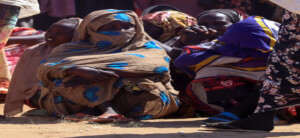‘Militiaman murdered my sister in North Darfur’: Daoud Hari
A woman was killed in Um Baru locality in North Darfur, allegedly by a member of the paramilitary Rapid Support Forces, last month.
A woman was killed in Um Baru locality in North Darfur, allegedly by a member of the paramilitary Rapid Support Forces, last month.
The woman from Muzbat was killed in the morning of Monday 21 August when she rode her donkey and led her seven cows out to pasture, in the northern part of Um Baru locality. When her donkey returned without her to Muzbat later that day, concerned villagers set out to find her, the New York Times quoted her brother Daoud Hari – author of 'The Translator: A Tribesman’s Memoir of Darfur' – today.
Her body was found four hours later. The women brought Noi’s body back to Muzbat and the men followed the tracks to the camp of the Rapid Support Forces (RSF), where the base commander came out to meet them. He refused to allow them into the camp, but told them he was holding the militia man who had confessed to killing the woman.
The villagers learned that the suspected killer was a RSF soldier, who had an injury to his head from fighting the woman. Villagers and people from neighbouring towns went back to the base the next day to demand justice. The pressure led to the commander sending the suspect to El Fasher under arrest.
The victim was Noi, the sister of the Darfuri author Daoud Hari. Hari became an interpreter and guide there for aid organisations and Western journalists. In 2006, he was captured, imprisoned and tortured by the government of Sudan. With help from the United States, he was released from prison and came to America as a refugee in March 2007.
Daoud Hari in the NY Times: “Perhaps the RSF commander thought he had to act because the evidence was undeniable and he was confronted with the angry villagers. Yet there have been no news reports, either about the attack and killing of Noi, or concerning the arrest of her suspected killer. In fact, two government officials later visited the village, found and deleted pictures of Noi’s body on villagers’ cellphones, and warned the inhabitants not to speak to the media.
“We, Noi’s family, are not surprised that the government is taking steps to hide its crimes. We fear that the killer will not see justice.”
Muzbat is one of the thousands of villages that came under attack by Sudan’s army and militias in the armed conflict in Darfur since 2003. Muzbat was attacked repeatedly in 2014.
Torture
Earlier this year, Hari and Phil Cox, a British journalist, both were detained for nearly two months by the Sudanese security service in a prison, and tortured. According to Amnesty International they were beaten, subjected to electric shocks, deliberately deprived of oxygen and subjected to mock executions. Cox and Hari had been commissioned by the UK’s Channel4 TV to investigate reports by Amnesty International that Sudanese security forces had used chemical weapons against civilians in Jebel Marra between January and August 2016.
After a week spent chained to a tree in North Darfur, the two filmmakers were transferred to other Sudanese government forces and moved to Kober Prison in the capital, Khartoum, where they were held for six weeks with other detainees, including human rights defenders, dozens of whom were being held without charge.
Source: New York Times











 and then
and then